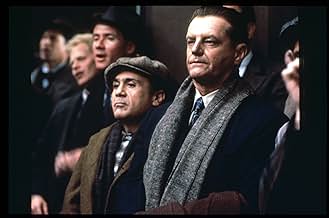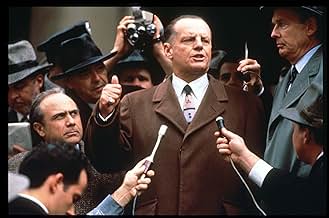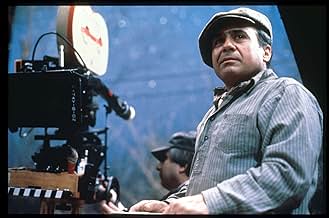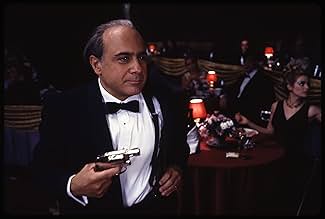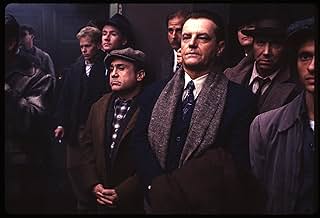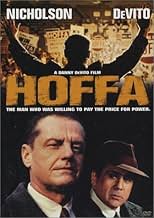AVALIAÇÃO DA IMDb
6,6/10
26 mil
SUA AVALIAÇÃO
A história da famosa figura da união americana Jimmy Hoffa, que organiza greves, lida com membros do sindicato do crime organizado e desaparece misteriosamente em 1975.A história da famosa figura da união americana Jimmy Hoffa, que organiza greves, lida com membros do sindicato do crime organizado e desaparece misteriosamente em 1975.A história da famosa figura da união americana Jimmy Hoffa, que organiza greves, lida com membros do sindicato do crime organizado e desaparece misteriosamente em 1975.
- Indicado a 2 Oscars
- 2 vitórias e 6 indicações no total
Joe Greco
- Loading Foreman
- (as Joe V. Greco)
Avaliações em destaque
While it is one of Nicholson's most challenging roles, as a viewer you find yourself more attached to director and co-star DeVito, who practically sunk every penny he owned into the making of this film. While the film did garner some Golden Globe nominations, altogether the film was a commercial and personal flop for all involved. The problem may have been that the world was not ready for this story. Nicholson is quite good as Hoffa, but one almost ignores the performance when you think of the personal attachment director DeVito had to the project. It is quite unfortunate because DeVito is interesting in a rare dramatic role. David Mamet did write a fine script and there is fine support from J.T.Walsh, Robert Prosky and Armand Assante.
In ten years, this film will be a classic!
In ten years, this film will be a classic!
Before I had seen Hoffa I was aware of the Union leader mainly for his disappearance and the jokes made about his last resting spot. My dad had always considered Hoffa a hero simply because he didn't buckle under to the big boys he fought them. Hoffa The movie captures the Essence of James R Hoffa perfectly. This is Nicholson's Finest role forget the Joker in Batman or Jack Torrence in THE SHINING. This is pure acting 100% You cannot tell where Hoffa the part and Nicholson the actor leave off. The movie moves from Flashbacks to Hoffa's last day on Earth and it makes you wonder about What happened to him. During the flashbacks we See Hoffa slowly emerging as a force within the Teamsters Union slowly gathering influence and power from the ranks of the working man. The Film fits the various Eras portrayed perfectly. It's like looking thru a window. The Corruption of Hoffa if you can call it that is slow and gradual and Hoffa's War With Bobby Kennedy is simply fantastic film making Devito didn't want to spoil the scene with words so he used the actual Hoffa Kennedy exchanges word by word word for word. And Nicholson must've studied that footage intently as he captures Hoffa's Every movement and even his eyes down to the rapid movements that Hoffa did. Devito knows his stuff and Proves it here. Great Film that deserves to be remembered as a true original CLASSIC! Just like the original James R. Hoffa a original classic.
Written with callous virtuosity by Mamet, directed with garishly vintage technique by DeVito, this hugely underrated, passionate, powerful film not only portrays Hoffa with the enhanced corporal magnitude of Nicholson, who gives a massive thrust of a performance, but it also reshuffles the ladder of American heroes as it's recognized nowadays. Several may be uneasily startled: This stylistic take on the life and mysterious disappearance of the Teamsters Union leader views Robert Kennedy as seen by Hoffa: a bellyaching Harvard-educated well-to-do, frantic for exposure, prepared to use evenhanded ways and biased to catch Hoffa, no equal at all for Hoffa in their incensed altercations.
In the context of most commercial movies, which insist on explaining too much or repeating the obvious, Hoffa remains a reasonably detached consideration of the career of a man whose ties to the Mafia not only cost the rank-and-file teamsters millions but also set a pattern for corruption that tainted the entire labor movement. It's a quintessentially American story, for only here did Big Labor become a big business to rival Big Business.
DeVito and the Great Character Development Skeptic neither romanticizie him or try to explore Hoffa outside his own mechanical justification that you have to do it to others before they do it you. Without commentary, in very broad strokes, they authenticate Hoffa's advancement from minor reformer to big-time shark, power-dealer and mob friend.
The movie opens as the edgy, dog-tired Jimmy, convoyed by his committed odd-job guy, conjured character Bobby, waits in a Cadillac in a Detroit cafeteria lot for a rendezvous with an abiding Mafia accomplice. The reminiscences that are the bulk of the film aren't Jimmy's, but the indulgent, diligent Bobby's. He worries about Jimmy's state of affairs, remembering their first meeting in the Depressed 1930s when, one night on the road, Jimmy invited himself into his truck and tried to enlist him for the teamsters. Jimmy was then something of an optimist. As the hours drone on in the lot, Bobby sequentially recalls his way through Jimmy's career.
While Bobby's remembrance is tender, this captivating, hazy biopic sees all coolly. This gives this forgotten '90s drama an indignantly cynical tone that is generally uncommon in American movies. It compels us to decide for ourselves, something that can be infinitely puzzling as well as gratifying. The film proposes there are occasions when one must reason for oneself. It doesn't pose as a docudrama or anything close. It's a skillful work of fiction, rooted in fact, devised with ingenuity and a dependable viewpoint.
DeVito's direction is crammed with overstated kinesics that appear wholeheartedly consistent with Bobby's exceedingly highlighted reminiscences of life with Jimmy. There are numerous striking overhead shots, whether it's a scene of Jimmy incarcerated or a panoramic view of union men wrestling scabs. Simultaneously, DeVito knows when to use close-ups, that is, to divulge character instead of to intersperse dialogue. When the director shows a recalled explosion and fire, they have the massive scope of something recounted in an anecdote told late at night in a favorite dive.
It comes as a surprise, about midway through, to learn that the Teamsters head has a wife and daughter. They appear during a crowd scene. But this film about Jimmy Hoffa has no time to show him meeting his wife, dating her, marrying her, finding their dream house, having a kid. That's about as it should be.
Does the movie grant that Jimmy was an instrument of organized crime? Not by any means. Nor does it quite maintain that Hoffa would take any advantage he could get, anywhere he could, to systematize the drivers and press-gang the bosses. He was a union realist, but what makes this movie so beguiling is that we can never entirely peep the romanticism that should be in there somewhere, no glow of internal principle. Something murky must be driving him on a lonesome, ruthless revenge.
Nicholson is an actor who can echo virtually anything in his face. His intense, volcanic performance is so good as Hoffa because he betrays virtually nothing. When we first see him, the corporal embellishments are striking. He's filled with spite, not optimism. He organizes for the same reason other guys get in bar fights, because it discharges the intense stresses within.
The production is plentiful with period particulars, consecutively in an enduring procession. The truckers' world distinguishes with the world of control occupied by the insiders: The Old World sophistication of the Mafia sociables, for instance, or the rooms where dominant government men dwell. The movie makes its implicit case for union organizing simply by complementing the cabs and roadstops of the drivers with the world of opportunity.
This is an inspired and vibrant piece, but is that sufficient? It sharply divided critics, but for me it is. Others will have valid protests to the ways the film works. This genuinely absorbing piece reveals DeVito as a sincere filmmaker. He extracts the core guise and pitch for this material. Not every director would've been self-assured enough to purely show us Jimmy Hoffa rather than narrating all about him. This is a movie that finds its impact between the lines, in what is unstated.
In the context of most commercial movies, which insist on explaining too much or repeating the obvious, Hoffa remains a reasonably detached consideration of the career of a man whose ties to the Mafia not only cost the rank-and-file teamsters millions but also set a pattern for corruption that tainted the entire labor movement. It's a quintessentially American story, for only here did Big Labor become a big business to rival Big Business.
DeVito and the Great Character Development Skeptic neither romanticizie him or try to explore Hoffa outside his own mechanical justification that you have to do it to others before they do it you. Without commentary, in very broad strokes, they authenticate Hoffa's advancement from minor reformer to big-time shark, power-dealer and mob friend.
The movie opens as the edgy, dog-tired Jimmy, convoyed by his committed odd-job guy, conjured character Bobby, waits in a Cadillac in a Detroit cafeteria lot for a rendezvous with an abiding Mafia accomplice. The reminiscences that are the bulk of the film aren't Jimmy's, but the indulgent, diligent Bobby's. He worries about Jimmy's state of affairs, remembering their first meeting in the Depressed 1930s when, one night on the road, Jimmy invited himself into his truck and tried to enlist him for the teamsters. Jimmy was then something of an optimist. As the hours drone on in the lot, Bobby sequentially recalls his way through Jimmy's career.
While Bobby's remembrance is tender, this captivating, hazy biopic sees all coolly. This gives this forgotten '90s drama an indignantly cynical tone that is generally uncommon in American movies. It compels us to decide for ourselves, something that can be infinitely puzzling as well as gratifying. The film proposes there are occasions when one must reason for oneself. It doesn't pose as a docudrama or anything close. It's a skillful work of fiction, rooted in fact, devised with ingenuity and a dependable viewpoint.
DeVito's direction is crammed with overstated kinesics that appear wholeheartedly consistent with Bobby's exceedingly highlighted reminiscences of life with Jimmy. There are numerous striking overhead shots, whether it's a scene of Jimmy incarcerated or a panoramic view of union men wrestling scabs. Simultaneously, DeVito knows when to use close-ups, that is, to divulge character instead of to intersperse dialogue. When the director shows a recalled explosion and fire, they have the massive scope of something recounted in an anecdote told late at night in a favorite dive.
It comes as a surprise, about midway through, to learn that the Teamsters head has a wife and daughter. They appear during a crowd scene. But this film about Jimmy Hoffa has no time to show him meeting his wife, dating her, marrying her, finding their dream house, having a kid. That's about as it should be.
Does the movie grant that Jimmy was an instrument of organized crime? Not by any means. Nor does it quite maintain that Hoffa would take any advantage he could get, anywhere he could, to systematize the drivers and press-gang the bosses. He was a union realist, but what makes this movie so beguiling is that we can never entirely peep the romanticism that should be in there somewhere, no glow of internal principle. Something murky must be driving him on a lonesome, ruthless revenge.
Nicholson is an actor who can echo virtually anything in his face. His intense, volcanic performance is so good as Hoffa because he betrays virtually nothing. When we first see him, the corporal embellishments are striking. He's filled with spite, not optimism. He organizes for the same reason other guys get in bar fights, because it discharges the intense stresses within.
The production is plentiful with period particulars, consecutively in an enduring procession. The truckers' world distinguishes with the world of control occupied by the insiders: The Old World sophistication of the Mafia sociables, for instance, or the rooms where dominant government men dwell. The movie makes its implicit case for union organizing simply by complementing the cabs and roadstops of the drivers with the world of opportunity.
This is an inspired and vibrant piece, but is that sufficient? It sharply divided critics, but for me it is. Others will have valid protests to the ways the film works. This genuinely absorbing piece reveals DeVito as a sincere filmmaker. He extracts the core guise and pitch for this material. Not every director would've been self-assured enough to purely show us Jimmy Hoffa rather than narrating all about him. This is a movie that finds its impact between the lines, in what is unstated.
Life made him famous, but death turned him into a legend. If it weren't for his mysterious disappearance probably due to his connections with the mob, it's doubtful that Jimmy Hoffa, the leader of the most powerful union would have been such a deeply rooted figure in American pop-culture. This posthumous place among the unsolved mysteries of the last century was begging for a movie adaptation, and Danny DeVito's turned into quite an interesting biopic, but strangely enough, it says a lot about the man without saying that much. At the end of the film, I knew some of his achievements, but the motives, the traumas, the obsessions, what makes a character fascinating, were still a mystery.
This is not to belittle the film's educational value, but I don't think such a complex public figure can be understood if we don't even have some quick glimpses about his past, his background and his family. It's as if Danny DeVito sticked with the public image of Hoffa and didn't give us enough to hook our hearts on outside the Teamster business, which is a pity because Jack Nicholson made the character and gave him such an aura that it genuinely made me curious about the man. Yet, nothing is shared except what he tells his friends, the mob, the journalists, and Bobby Kennedy. I was begging for an intimate moment with his wife, not because "behind every great men, there's a woman" but because men do confess to their wives, share with them the off-the-record stuff, but "Hoffa" is not in the same caliber than, say, Oliver Stone's "Nixon", which is about a no less controversial figure. And I guess I wasn't surprised because I saw the wife in the middle of the film but because she was showed while she was useless plot-wise.
On the other hand, the film tackles its subject in a very serious and entertaining way that I'm asking myself if DeVito or the screenwriters did have enough material to approach the privacy of Hoffa, maybe they didn't, or maybe they had but they didn't have enough time. The film is more trying to answer to the question of Hoffa's whacking than the typical rise and fall, it's more about the way he became an instrument of the mob with a pragmatic view on the ends- justifies-the mean theory, but we never see how effective they are for the Teamsters. I learned more about the rights and the struggle of truck drivers from the underrated film-noir "They Drive by Night" or the thriller "Wages of Fear" than "Hoffa", which is saying a lot because it had to be about trucks too, Ebert said that DeVito showed a man who was all about trucks, he talked and breathed 'truck', well how about showing these trucks in the first place? The film fails providing insights on the character by focusing too much on the controversy; it doesn't help to get enough perspective. Imagine if "Nixon" was only about the Watergate, you wouldn't have known about Nixon AND the Watergate either, DeVito's film lacked focus and scope.
It's interesting that the film was made in 1992, the same year than another and better biopic, Spike Lee's "Malcolm X", the film is three-hour long but takes you from the roots of the leader, when he was a small-time crook to his rise as one charismatic orator. In "Hoffa", we never see him driving a truck, nourishing his heart with socialist ideas and revolting against the system. From the beginning, he's like a politician haranguing the comrades. I take it from granted than what he say is true, but it's not about belief, but empathy, the film is not about making Hoffa a good or a bad guy, but letting the viewer figuring out. If he was bad enough (in the "practical" meaning) to stick with the gangsters when he became powerful, it would be interesting to see how he started as an idealistic man, and it would make the corruption of his morality more interesting. That's what great biopics are about: evolutions, and never in "Hoffa", do we feel that the guy is changing, in bad or good, it doesn't matter, but there's no dynamics whatsoever.
And again, it's a pity because the performances are good, I can't believe Nicholson got a Razzie nomination for this, granted it wasn't the best of his career, but he did bring some energy and passion in the character. But what lacked was a structure, a right choice of episodes that would tell us something about a controversial figure. The film is two-hour and fifteen minutes long, I wouldn't have minded it being much longer if it could enlighten me on the private face of Jimmy Hoffa, we're talking about a character played by Nicholson, who's got a great chemistry with his real-life friend Danny DeVito, the film had the potential, the ambition, probably the budget, the writing was good, but the storytelling not so.
Still, for what it is, it's not wasted time, and the film has a solid consistency in it, and at least, it does something that almost redeems the flaws I mentioned: it ends with the best scene, the most memorable one. In terms of shock and emotion, even though we know the story of Jimmy Hoffa, we don't see the ending coming, and it did left me puzzled and shocked when I saw it for the first time. The film needed more moments like this, but all in all, it's a solid drama.
This is not to belittle the film's educational value, but I don't think such a complex public figure can be understood if we don't even have some quick glimpses about his past, his background and his family. It's as if Danny DeVito sticked with the public image of Hoffa and didn't give us enough to hook our hearts on outside the Teamster business, which is a pity because Jack Nicholson made the character and gave him such an aura that it genuinely made me curious about the man. Yet, nothing is shared except what he tells his friends, the mob, the journalists, and Bobby Kennedy. I was begging for an intimate moment with his wife, not because "behind every great men, there's a woman" but because men do confess to their wives, share with them the off-the-record stuff, but "Hoffa" is not in the same caliber than, say, Oliver Stone's "Nixon", which is about a no less controversial figure. And I guess I wasn't surprised because I saw the wife in the middle of the film but because she was showed while she was useless plot-wise.
On the other hand, the film tackles its subject in a very serious and entertaining way that I'm asking myself if DeVito or the screenwriters did have enough material to approach the privacy of Hoffa, maybe they didn't, or maybe they had but they didn't have enough time. The film is more trying to answer to the question of Hoffa's whacking than the typical rise and fall, it's more about the way he became an instrument of the mob with a pragmatic view on the ends- justifies-the mean theory, but we never see how effective they are for the Teamsters. I learned more about the rights and the struggle of truck drivers from the underrated film-noir "They Drive by Night" or the thriller "Wages of Fear" than "Hoffa", which is saying a lot because it had to be about trucks too, Ebert said that DeVito showed a man who was all about trucks, he talked and breathed 'truck', well how about showing these trucks in the first place? The film fails providing insights on the character by focusing too much on the controversy; it doesn't help to get enough perspective. Imagine if "Nixon" was only about the Watergate, you wouldn't have known about Nixon AND the Watergate either, DeVito's film lacked focus and scope.
It's interesting that the film was made in 1992, the same year than another and better biopic, Spike Lee's "Malcolm X", the film is three-hour long but takes you from the roots of the leader, when he was a small-time crook to his rise as one charismatic orator. In "Hoffa", we never see him driving a truck, nourishing his heart with socialist ideas and revolting against the system. From the beginning, he's like a politician haranguing the comrades. I take it from granted than what he say is true, but it's not about belief, but empathy, the film is not about making Hoffa a good or a bad guy, but letting the viewer figuring out. If he was bad enough (in the "practical" meaning) to stick with the gangsters when he became powerful, it would be interesting to see how he started as an idealistic man, and it would make the corruption of his morality more interesting. That's what great biopics are about: evolutions, and never in "Hoffa", do we feel that the guy is changing, in bad or good, it doesn't matter, but there's no dynamics whatsoever.
And again, it's a pity because the performances are good, I can't believe Nicholson got a Razzie nomination for this, granted it wasn't the best of his career, but he did bring some energy and passion in the character. But what lacked was a structure, a right choice of episodes that would tell us something about a controversial figure. The film is two-hour and fifteen minutes long, I wouldn't have minded it being much longer if it could enlighten me on the private face of Jimmy Hoffa, we're talking about a character played by Nicholson, who's got a great chemistry with his real-life friend Danny DeVito, the film had the potential, the ambition, probably the budget, the writing was good, but the storytelling not so.
Still, for what it is, it's not wasted time, and the film has a solid consistency in it, and at least, it does something that almost redeems the flaws I mentioned: it ends with the best scene, the most memorable one. In terms of shock and emotion, even though we know the story of Jimmy Hoffa, we don't see the ending coming, and it did left me puzzled and shocked when I saw it for the first time. The film needed more moments like this, but all in all, it's a solid drama.
All too often Jack Nicholson just coasts and plays his stock character. Sometimes it's boring, occasionally it's insulting, but in "Hoffa" Nicholson puts aside the sneer and the leer and delivers a knockout performance. Although he doesn't really look that much like the Teamster boss, Nicholson captures the man's aura perfectly. It's more than just nailing the vocal rhythms and inflections or mastering Hoffa's body language, you feel Nicholson is conveying the inner man as well. This is truly a multi-dimensional interpretation and it's absolutely stunning.
Unfortunately, the film is an inadequate showcase for Nicholson's talents. The story begins in 1975 on what presumably was the last day of Hoffa's life as he and his pal Bobby Ciaro (Danny DeVito) wait for some people to show up for a meeting at a Michigan roadhouse. They wait a long time which allows Bobby to recall many incidents in Hoffa's extraordinary career as a union organizer.
There are two problems with this. First Bobby, who's supposed to be something of an enforcer, is never credible. Although he's nearly always in view, he never seems to belong. Perhaps that's because he's entirely a creation of screenwriter David Mamet. Barely adequate as a story-telling device, Bobby's unfortunate insertion gives rise to the inevitable, more serious question: how much of this story is true?
If you accept Mamet's interpretation, Hoffa was a victim of a trusted associate, the Government, and the Mob, but foremost a hero because he fought for the working man. Fair enough. But when you watch "Hoffa" you don't really get a clear sense of why all this was so. Motivations are largely absent. The flashbacks pass by but you feel these are merely sketches or outlines, often presented without clear context. Some are believable, others seem to be mere speculation, still others, such as the scenes with Robert Prosky or the enormous riot sequence, implausible. Was Prosky's character real? Did so many people actually die? Ask Bobby, because in many ways it's as much his story as Hoffa's; but as we know, Bobby is pure fiction.
Mamet has been quoted as saying audiences look more for drama than for information. Fine, and who'd want to see Ken Burns' take on the Teamsters. But "Hoffa", for all its huffing and puffing, lacks the drama of Paul Schrader's "Blue Collar" or the better Mob pictures.
Recommended solely for Nicholson's performance.
Unfortunately, the film is an inadequate showcase for Nicholson's talents. The story begins in 1975 on what presumably was the last day of Hoffa's life as he and his pal Bobby Ciaro (Danny DeVito) wait for some people to show up for a meeting at a Michigan roadhouse. They wait a long time which allows Bobby to recall many incidents in Hoffa's extraordinary career as a union organizer.
There are two problems with this. First Bobby, who's supposed to be something of an enforcer, is never credible. Although he's nearly always in view, he never seems to belong. Perhaps that's because he's entirely a creation of screenwriter David Mamet. Barely adequate as a story-telling device, Bobby's unfortunate insertion gives rise to the inevitable, more serious question: how much of this story is true?
If you accept Mamet's interpretation, Hoffa was a victim of a trusted associate, the Government, and the Mob, but foremost a hero because he fought for the working man. Fair enough. But when you watch "Hoffa" you don't really get a clear sense of why all this was so. Motivations are largely absent. The flashbacks pass by but you feel these are merely sketches or outlines, often presented without clear context. Some are believable, others seem to be mere speculation, still others, such as the scenes with Robert Prosky or the enormous riot sequence, implausible. Was Prosky's character real? Did so many people actually die? Ask Bobby, because in many ways it's as much his story as Hoffa's; but as we know, Bobby is pure fiction.
Mamet has been quoted as saying audiences look more for drama than for information. Fine, and who'd want to see Ken Burns' take on the Teamsters. But "Hoffa", for all its huffing and puffing, lacks the drama of Paul Schrader's "Blue Collar" or the better Mob pictures.
Recommended solely for Nicholson's performance.
Você sabia?
- CuriosidadesThe only major make-up Jack Nicholson had to wear to become Jimmy Hoffa was fake nose and a set of false upper teeth (as seen in the behind-the-scenes footage on the DVD).
- Erros de gravaçãoWhen Jimmy and Billy torch bomb the building, they create a blast so intense, it blows out the passenger side window on Bobby's truck. Yet in the following shots, the window goes from being intact, to being shattered.
- Citações
Jimmy Hoffa: If a guy's close to you, you can't slight 'im. You can't slight that guy. A real grievance can be resolved; differences can be resolved. But an imaginary hurt, a slight - that motherfucker gonna hate you 'til the day he dies.
- Cenas durante ou pós-créditosthere are no opening credits and the title of the film at the beginning.
- Versões alternativasOn a special laserdisc edition, Danny DeVito hosts a supplemental portion of the disc with outtakes, including a scene where Hoffa perfectly shoots a beer bottle with a rifle.
- Trilhas sonorasLet's Make Love Tonight
Written, Produced and Performed by Nicky Addeo
Principais escolhas
Faça login para avaliar e ver a lista de recomendações personalizadas
- How long is Hoffa?Fornecido pela Alexa
Detalhes
Bilheteria
- Orçamento
- US$ 35.000.000 (estimativa)
- Faturamento bruto nos EUA e Canadá
- US$ 24.276.506
- Fim de semana de estreia nos EUA e Canadá
- US$ 6.406.012
- 27 de dez. de 1992
- Faturamento bruto mundial
- US$ 29.302.121
- Tempo de duração2 horas 20 minutos
- Cor
- Proporção
- 2.39 : 1
Contribua para esta página
Sugerir uma alteração ou adicionar conteúdo ausente

Principal brecha
By what name was Hoffa - Um Homem, Uma Lenda (1992) officially released in India in English?
Responda


